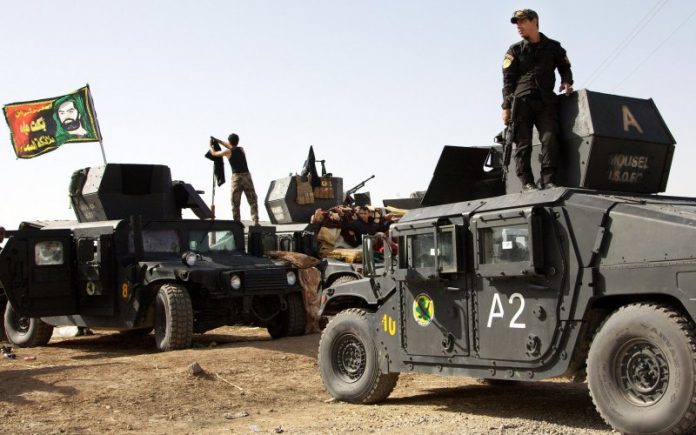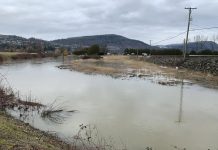Mosul’s importance in the so-called caliphate makes the battle to reclaim the city unlike any other battle between the Iraqi forces.
Iraqi security forces are ahead of schedule on day one of offensive to retake Mosul from the so-called “Islamic State,” the Pentagon said. Iraqi forces and Kurdish peshmerga launched the offensive early Monday.
“Early indications are that Iraqi forces have met their objectives so far, and that they are ahead of schedule for this first day,” Pentagon press secretary Peter Cook said, also warning that it was unknown how long the battle would last.
The Iraqi security forces and Kurdish peshmerga fighters, backed by US air and ground support, started the operation to retake Mosul from the “Islamic State” (IS), Prime Minister Haider al-Abadi announced early Monday on state television.
“The time of victory has come and operations to liberate Mosul have started,” he said in an address broadcast by the Al Iraqiya channel. “Today I declare the start of these victorious operations to free you from the violence and terrorism of Daesh,” he said, using an Arabic acronym for the terror group.
The White House said Iraqi forces have taken the leading role in this operation, with US troops in Iraq serving to train, advise and assist Iraqis. “With the symbolic importance that ISIL [IS] has invested in their control of Mosul, dislodging them from the city would be a significant strategic gain,” said White House spokesman Josh Earnest.
Retaking the city would be a major blow to IS, which overran much of the country after seizing Mosul in June 2014 from a fleeing Iraqi army, capturing tanks, weapons, ammunition and money to fuel its subsequent growth.
The long-awaited offensive to recapture Iraq’s second-biggest city follows months of preparations after security forces largely pushed the Sunni extremist group from central Iraq over the past year.
In Washington on Monday, US Defense Secretary Ash Carter called the launch of the operation “a decisive moment in the campaign” to defeat to IS.
The coordinated offensive involves sometimes rival forces, including Iraqi Kurdish peshmerga to the north and east of the city, with the Iraqi army, Sunni tribal units and Shiite militia moving in from the south.
To retake Mosul, the combined forces will have to push through 20-30 kilometers (12-18 miles) of IS-held territory before reaching the outskirts of the city, where several thousand IS fighters have had two years to build defenses. Local media reported territorial gains in villages around the city early on Monday afternoon.
Lieutenant General Stephen Townsend, the commander of the US-led coalition against IS, said in a statement that the operation to regain control of Mosul could take “weeks, possibly longer.”
“Iraq is supported by a wide range of coalition capabilities, including air support, artillery, intelligence, advisers and forward air controllers. But, to be clear, the thousands of ground combat forces who will liberate Mosul are all Iraqis,” he said.
Once Iraqi security forces reach the city, the country’s elite counterterrorism units are likely to spearhead the urban battle as they did in Tikrit and Fallujah. Several thousand IS fighters are holed up in the city and likely to use snipers, suicide bombers, bomb-laden vehicles and booby traps to slow the Iraqi advance.
But the operation has also raised concern over an impending humanitarian crisis in a city where a million people still live.
Stephen O’Brien, the UN’s undersecretary-general for humanitarian affairs, said in a statement that “depending on the intensity and scope of the fighting, as many as 1 million people may be forced to flee their homes in a worst-case scenario.”
He warned that civilians could be caught in the crossfire and may be used as human shields to protect IS fighters from US-led coalition airstrikes. Already overburdened aid organizations have warned that they are unprepared to handle large-scale humanitarian upheaval.
Even when Mosul is liberated, overcoming the various political rivalries and interests in Nineveh province is likely to unleash a power struggle. While the various armed groups cobbled together for the Mosul operation have a joint interest in fighting IS, the question remains over what they will have in common once the city falls.
It is unclear what kind post-IS political agreement has been reached to govern the largely Sunni Arab city, traditionally one of the most restive and anti-government since the 2003 US invasion of Iraq.
The Iraqi Kurds said they had struck a political deal with the central government ahead of the assault under which peshmerga forces and their allies would advance from north, east and southeast, but would not enter the mostly Sunni Arab city, where their presence would be opposed.
In a statement on Saturday, Masoud Barzani, the head of the autonomous Kurdistan region, said “Baghdad and Irbil [the capital of Iraqi Kurdistan and seat of the partly autonomous regional government] have also agreed to establish a joint higher political committee whose task would be to supervise the affairs of Mosul after the liberation.”
Another concern is the role of Iran-backed Shiite militia, or Popular Mobilization Units, which have been accused of human rights abuses against Sunnis but have been a valuable force bolstering government forces from the south. Details of a deal have not been published, but it has been reported that – similar to the peshmerga’s arrangement – the Shiite militia forces will also not enter Mosul.
Turkey, which has close relations with the Iraqi Kurds, has been at odds with Baghdad over its base in Bashiqa in Kurdish-controlled territory just behind the front lines.
The base has been used by Turkey to train about 3,000 soldiers tied to former Nineveh governor and Sunni politician Atheel al-Nujaifi, a rival of the central government. Turkey argues that this force should be involved in holding Mosul once it is recaptured and has warned that the offensive could upset the ethnic and sectarian structure of the largely Sunni city.
As the Iraqi government announced the start of the operation, Turkish President Recep Tayyip Erdogan reiterated that Turkey could not allow “Sunni-Shiite strife” in the city and insisted “it is not possible for us to stay outside.”
Part of Turkey’s motivation to intervene is that the Kurdistan Workers’ Party, which has fought a three-decade war with Turkey and is a rival of Barzani, may also join the Mosul operation to the northwest of the city.















